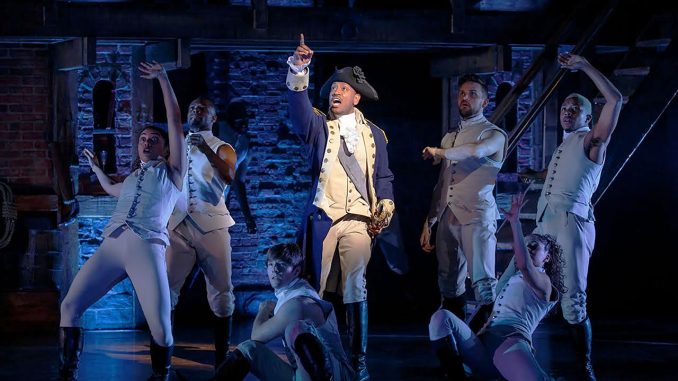
When Bryan Terrell Clark first performed the solo number “One Last Time” as George Washington in the Broadway musical “Hamilton,” he took the stage at the same time former President Barack Obama was delivering his final speech as president in Chicago.
To sing “One Last Time” — a song about Washington’s decision not to run for re-election — in conjunction with the farewell address of America’s first and long-awaited Black president made the experience that much more powerful for Clark.
“I’m a Black man playing George Washington, and I was extremely aware in the middle of the song that I was singing what essentially George Washington created as a tradition among presidents,” said Clark, a 2003 theater alumnus. “That when they’re stepping down, they do a speech.”
“I was aware that President Obama, who was our first Black president, was in Chicago at the very same moment doing his ‘one last time’ speech,” Clark added.
“Hamilton,” an award-winning Broadway musical, tells the story of Founding Father and the first Secretary of the Treasury Alexander Hamilton through song and rap. Clark has played the role of Washington since January 2017.
He and his co-stars play the Founding Fathers as people of color. He said Washington and Hamilton had a father-and-son-like relationship because Hamilton grew up as an orphan. Clark wanted to make sure this relationship was strongly conveyed.
“Physically, as men of color, that was one of the storylines that was really important to me when I watched it,” he said. “I wanted to make sure that when I was portraying it that that part of their relationship was highlighted.”
While on stage as Washington, Clark said he thinks he brings a stronger human quality to the role than what is conveyed in history books. He presents Washington to the audience as not just a great leader, but also a hard-working man.
“I think that the thing that people don’t realize about George Washington is that he was a farmer who became a general who became a president who became a farmer again,” Clark said. “[People have] this idea of George Washington walking in this heavy space, but I wanted you to see the man behind all that. He’s not someone who built a country before. He’s a citizen learning how to be a leader.”
Breaking down racial barriers is something Clark has prioritized since the start of his acting career. He said during his time at Temple, he struggled to find meaning in classes because many of them lacked diversity.
According to the Fall 2016 Student Profile, 62.4 percent of students in the School of Theater, Film and Media Arts were white. 12.1 percent were Black.
“I didn’t feel when I was there that the faculty and staff who were running the program had a real grasp on what was happening in the industry at the moment,” Clark said.
He said at the time, there was only one professor of color in the theater department, Kimmika Williams-Witherspoon, who still teaches theater studies and playwriting at the university.
During his time at Temple, Clark befriended Amina Robinson, a 2003 master’s of acting alumna, who is now an acting and musical theater professor in the department. She acted with Clark in Temple’s performance of August Wilson’s “Seven Guitars,” which follows the lives of seven African-Americans in 1948. All of the students involved in this production were people of color.
“Bryan was always so driven and motivated and highly talented,” Robinson said. “He actually got the lead role in the show, usually reserved for a grad student.”
But when Clark left Temple’s theater program, he learned much more about the difficulties of the acting industry.
He said Broadway auditions often include multiple steps that begin with a pre-screening and end with a final audition in front of producers. He said finding an audition typically begins with his agent submitting him for a role or being requested to audition. For “Hamilton,” Clark auditioned upon request.
Clark was called in to audition when producers thought actor Christopher Jackson was leaving his role as Washington. When Jackson decided to stay, Clark was no longer needed. A year later, this happened again, and then again.
“I auditioned seven times,” Clark said. “By round five or six, I definitely wanted to give up. I told my agent, ‘Why am I going back into this show? I’m tired of putting my heart on the line to hear no, or to hear wait.’”
But Clark kept going back. And when he booked the role after his seventh audition, he said he was ecstatic.
In early February, Clark talked about his experience with Temple theater students enrolled in the course Production Practicum.
Salvatore Mirando, a senior musical theater major in the class, said Clark discussed the importance of having passion for performances and how an actor can bring their individual personality into a role.
“It was inspirational to have him talk about how to never give up the fight,” Mirando said.
Clark added that patience and coping with rejection were essential to locking his role as Washington.
“As an actor, the things you can’t control are the how and the when,” Clark said. “I don’t think so much that you can’t be successful because it takes a bunch of luck to have opportunity. I think most people aren’t patient enough.”



Be the first to comment